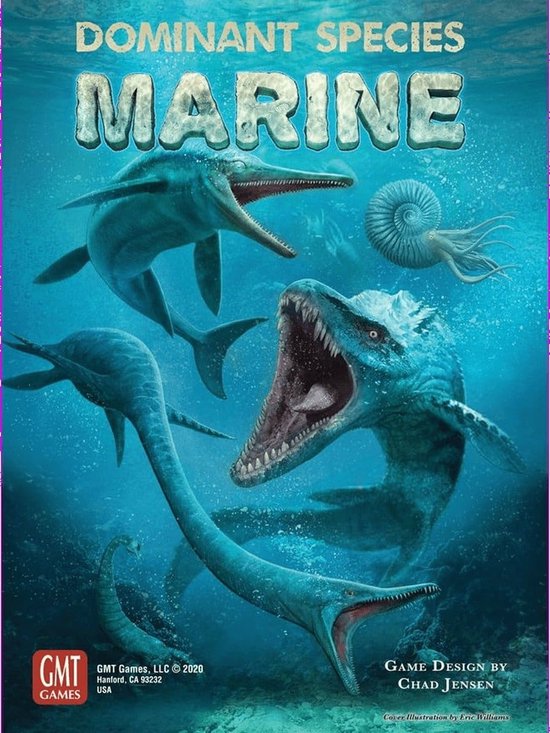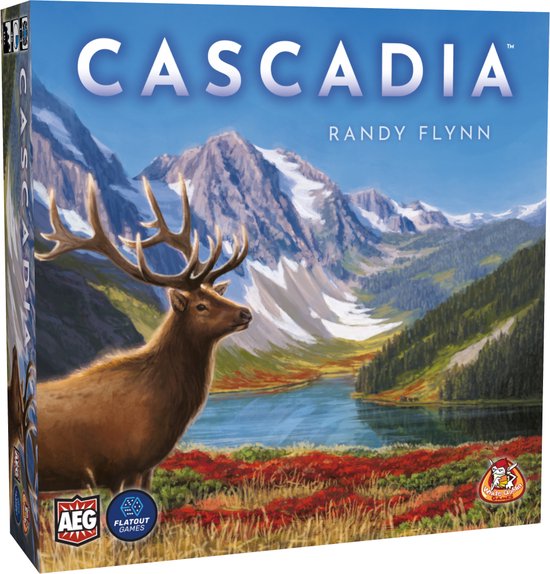Dominant species marine

Op voorraad. Voor 17:00 uur besteld, morgen in huis
Sixty-Something Millions of Years Ago — A great ice age has ended. With massive warming altering the globe, another titanic struggle for supremacy has unwittingly commenced between the varying animal species.
Dominant Species: Marine is a game that abstractly recreates a small portion of ancient history: the ending of an onerous ice age and what that entails for the living creatures trying to adapt to the slowly-changing earth.
Each player will assume the role of one of four major aquatic-based animal classes — reptiles, fish, cephalopod or crustacean. Each begins the game more or less in a state of natural balance in relation to one another. But that won’t last: It is indeed “survival of the fittest.”
Through wily action pawn placement, you will attempt to thrive in as many different habitats as possible in order to claim powerful card effects. You will also want to propagate your individual species in order to earn victory points for your animal. You will be aided in these endeavors via speciation, migration and adaptation actions, among others.
All of this eventually leads to the end game – the final ascent of a vast tropical ocean and its shorelines – where the player having accumulated the most victory points will have their animal crowned the Dominant Species.
But somebody better become dominant quickly, because there’s a large asteroid heading this way....
Game Play
The large hexagonal tiles are used throughout the game to create an ever-expanding interpretation of the main ocean on earth as it might have appeared tens of millions of years ago. The smaller Hydrothermal Vent tiles will be placed atop some of the larger tiles throughout play, converting them into Vents in the process.
The action pawns drive the game. Each pawn allows a player to perform the various actions that can be taken—such as speciation, environmental change, migration or evolution. When placed on the action display, a pawn will immediately trigger that particular action for its owning player. Dominant Species: Marine includes new “special” pawns that can be acquired during the course of play. These special pawns have enhanced placement capabilities over the “basic” pawns that each player begins the game with.
Generally, players will be trying to enhance their own animal’s survivability while simultaneously trying to hinder that of their opponents’—hopefully collecting valuable victory points along the way. The various cards will aid in these efforts, giving players useful one-time abilities, ongoing benefits, or an opportunity for recurring VP gains.
Throu
- 1 Bekijk alle specificaties

Prijs:


Speeltijd: 180 minuut
Spelsoort: Strategisch spel
Taal spel: Engels
Taal handleiding: Engels
Aantal benodigde accu's/batterijen: 0
Merk: GMT Games
EAN: 0817054012008
Materiaal: Karton
Kan zelfstandig met internet verbinden: Nee
App vereist voor volledige functionaliteit: Nee
App werkt op besturingssyteem: Niet van toepassing
Delen van gebruikersgegevens vereist: Niet van toepassing
Wifi vereist: Niet van toepassing
Bluetooth vereist: Niet van toepassing
Mobiele data verbinding mogelijk: Niet van toepassing
Betaalde diensten vereist: Niet van toepassing
Compatibel met: Niet van toepassing
Introductiejaar: 2021
Ondersteuning met updates: Niet van toepassing
Aanbevolen maximum leeftijd: 99 jaar
Aanbevolen minimum leeftijd: 14 jaar
Aantal meegeleverde accu's/batterijen: 0
Doelgroep: Kinderen en volwassenen
Jaar van uitgave: 2021
Leerthema: Bordspel
Maximaal aantal spelers: 0
Minimale aantal spelers: 0
Personage van toepassing: Nee
Speleditie: Standaard editie
Voedingstype: Niet-elektrisch
EAN: 0817054012008